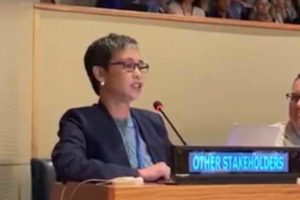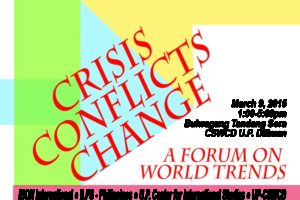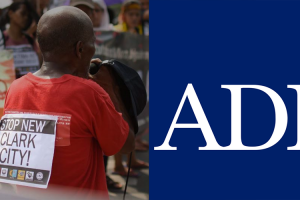We, 52 women and men from 18 countries (Bangladesh, Burma, Cambodia, China and Hongkong SAR,India, Indonesia, Kyrgyzstan, Lebanon, Mexico, Pakistan, Philippines, Sri Lanka, South Korea, Spain,Thailand, Timor Leste, USA, and Vietnam) and representing peasants, agricultural workers, fisherfolk,indigenous peoples, workers, women, youth and students, refugees and stateless persons, academia,environmental and support NGOs and networks met for the ‘Promoting a Transformative Agenda for Sustainable Development: A Strategy Workshop on Rio+20’ on August 15-17, 2011 in Bangkok, Thailand.
We have come to this meeting fully aware that twenty years after the UN Conference on theEnvironment and Development in Rio de Janeiro, popularly known as the Earth Summit, the world isfarther than ever from reaching the goals of genuine people-centered sustainable development. The multi-faceted, yet interconnected crises encompassing the economic, political and ecological spheresare causing unparalleled suffering all over the world. Worst afflicted are people from poor countries, most especially women and indigenous peoples.
This crisis of global capitalism further propels profit-driven and unsustainable development that causes irreversible damage to the world’s environment. This crisis results in the global climate meltdown, theappropriation of natural resources and the destruction of lives and livelihoods, especially of ecologically sensitive indigenous and traditional livelihood systems.
Rio+20 in 2012 thus comes at an opportune time, when the world’s governments and peoples areobliged to think of alternatives to the current development model with its ever-increasing failures. Itpresents opportunities to push urgently and comprehensively the agenda for genuine people-centered sustainable development.
Indeed, solutions exist. And they are in our hands, the people, who in our communities, workplaces,farms and forests, make the building blocks of genuine people-centered sustainable development. As we strengthen and consolidate our movements to achieve genuine economic, political, social, gender,ecological and climate justice, we call on the leaders of governments, multilateral institutions and otherstakeholders to heed the people’s calls for genuine sustainable development.
We urge governments and the UN system to deliver and not backtrack on the promises andcommitments made in Rio twenty years ago.
In particular, we put forward these messages:
On the Green Economy
We are alarmed at the corporatization of the Green Economy agenda. We believe that technological fixes and market-based incentives are false solutions to the ecological and climate crises and will notadvance sustainable development.
For sustainable economies to develop, it is crucial to democratize ownership, control and decisionmakingover productive resources and assets. We should move from a capital investment model towards an appropriate mix of more democratic modes such as cooperative, community-based anddriven, commons or public forms of ownership to ensure that economic activity provides sustainable livelihoods and meets the developmental goals of the community and society.
- Public enterprises should remain in public control and privatization should be reversed.
- Promote sufficiency-based economies (i.e. catering primarily towards meeting local needs and Promote sufficiency-based economies (i.e. catering primarily towards meeting local needs and;
- Manufacturing should promote closed-loop production where products are designed withminimum use of energy and materials, longer life-spans and with maximum reuse and recyclingof parts and components.
- Promote mass public transportation systems.
- Implement genuine agrarian, aquatic, pastureland and forestry reforms; and promote biodiverse ecological agriculture that benefit small producers, especially women and indigenous people.
- Stop profit-oriented exploitation and destruction of natural resources that destroy lives and livelihoods.
- Stop industrial corporate agriculture and fisheries.
- No to renewable energy that depends on monoculture and biomass extraction.
- Respect and promote community-based and farmer-driven efforts in organic agriculture,seedbanking and on farm improvement of crop varieties and animal breeds.
- People-centred sustainable economies should promote the rights of indigenous peoples andlocal communities in accordance with UNDRIP including rights to land and resources, and free,prior and informed consent (FPIC).
On the Institutional Framework for Sustainable Development
To deliver on the promises of the first Earth Summit, there is a need for an effective and democraticinstitutional framework that can and will ensure economic progress, social equity and environmentalprotection – the three pillars of sustainable development — in an integrated and holistic manner. This governance architecture must operationalize and implement the Rio principles including the Right toDevelopment, common but differentiated responsibility, the polluter pays principle and theprecautionary principle.
- Building a strong apex body on sustainable development that works on a global level and can integrate the disparate United Nations bodies working on one of the three pillars of sustainable development is desirable. Options that should be explored include transforming the Commission on Sustainable Development into a Council on Sustainable Development, or establishing a UN Organization on Sustainable Development.
- Rio+20 should work for the immediate establishment of a broad inclusive multi-stakeholderconsultative body or network tasked with supporting the promotion and implementation of Agenda 21 and Rio+20 resolutions. Such body should be participatory, democratic, and have anintegral multi-stakeholder character that accords civil society with equal rights and equal voiceas governments.
- Ultimately, the effectiveness of a global body on sustainable development rests on the effective functioning of similar institutions at the local and national levels and its relevance to people’s lives.
On New and Emerging Issues
- The UNCSD 2012 must affirm and strengthen internationally-agreed principles and objectives for sustainable development at all levels of government. All actors should be held accountable to well-established international standards and conventions – e.g. Right to Development, Human Rights conventions, Extractive Industry Accountability, Transparency Accountability Initiative,etc.
- Reorganize international trade, investment, finance and development cooperation relations around rules that value, respect, protect and fulfill people’s rights; economic, social, gender ecological and climate justice; economic sovereignty and self-sufficiency.
- Enhance development cooperation in support of sustainable development. Commitments from the North in the form of adequate financing (according to common butdifferentiated responsibility), appropriate technology cooperation, and needs-based capacity building are of utmost importance to support developing countries make a just transition to sustainable development pathways.
- Developing countries and their development partners should evaluate the coherence of their policies in trade and investments and rectify those that are incoherent with sustainable development. Repudiate unequal trade and investment agreements.
- Restructure foreign direct investments in the context of South-South Cooperation (not North-South or South-South competition) to include regulatory controls and a transition period.
- Uphold food sovereignty to address the food crisis. Communities should have the right todetermine their patterns of food production and consumption, and famers should be able to prioritize food production for domestic consumption. Government should give incentives to sustainable food production practices.
- Reject the intellectual property rights regime and other monopolistic enclosures that impede people’s access to commons and productive resources.
- There should be a global mechanism to assess the impacts of new technologies. Such mechanism should provide resources towards building capacity of countries and communities toassess and monitor the health, biodiversity and environmental impacts of new technologies. We support the adoption of an International Convention for the Evaluation of New Technologies (ICENT) and an outright ban on technologies that put the planet at grave risks such as geoengineering.
- Governments should invest in research and development on people-centered sustainable development.
- Policies should respect cultural diversity, and modern science should be combined withindigenous knowledge in bottom-up approaches of research and development to develop technologies that are appropriate and democratic.
Communities have shown extreme resilience and creativity in confronting the spiraling multiple crises, utilizing various mechanisms not just to survive, but also to assert their economic, social, cultural and political rights. In the midst of this protracted crisis of the global capitalist system, people dare to imagine and build a new world where development means promoting the well-being and dignity of all; where prosperity is created through shared resources and efforts; where nature’s limits are respected; and where nations, peoples and communities cooperate to ensure democracy, justice, equity, peace and prosperity for all.
Today, even more so than twenty years ago, people of the world are aware that the challenge of genuine sustainable development requires no less than the profound transformation of societies and ofinternational relations. We must all rise up to the challenge.
Signatories:
- Aidwatch Philippines Anakbayan?California/Katarungan?Washington DC, USA.
- Arab NGO Network for Development (ANND), Lebanon.
- Asia Indigenous Peoples Pact (AIPP).
- Asia Monitor Resource Center (AMRC), Hong Kong.
- Asia Pacific Forum for Women, Law and Development (APWLD).
- Asia Pacific Research Network (APRN).
- Asia Society for Social Improvement and Sustainable Transformation (ASSIST), Philippines.
- Burma Environmental Working Group (BEWG).
- Center for Community Economics and Development Consultants (CECOEDECON), India.
- Centre for Environment and Development (CED), Sri Lanka.
- Center for Peoples Democratic Governance (CPDG), Philippines.
- Centre for Sustainable Development in Mountainous Areas (CSDM), Vietnam.
- Centre for Sustainable Rural Development, Vietnam.
- China Association of NGOs (CANGO), China.
- Coastal Development Partnership (CDP), Bangladesh.
- Cooperation Committee for Cambodia (CCC).
- Dignity International Earth Rights International.
- Development Research and Training–Kansanga Kampala Uganda.
- Ecumenical Institute for Labor Institute (EILER), Philippines.
- Equity and Justice Working Group Bangladesh (EquityBD), Bangladesh.
- ETC Group.
- Forum of Womens NGOs of Kyrgyzstan.
- Foundation for Consumers, Thailand.
- Green Movement of Sri Lanka (GMSL).
- IBON International.
- International NGO Forum for Indonesian Development (INFID), Indonesia.
- Institute for Motivating Self?Employment (IMSE), India.
- Instituto de Estudios Politicos para America Latina y Africa (IEPALA), Spain.
- Khmer Institute for Democracy (KID), Cambodia.
- Korean Civil Society Forum on International Cooperation (KOFID), South Korea.
- Korean Federation for Environmental Movement (KFEM), South Korea.
- Korea NGO Council for Overseas Cooperation (KCOC), South Korea.
- Local Development Institute, Thailand.
- MWENGO, Africa.
- Navdanya International.
- ODA Watch Korea.
- Participatory Research and Development Initiative (PRDI), Bangladesh.
- Pesticide Action Network Asia Pacific (PAN AP).
- Peoples Movement on Climate Change (PMCC).
- Peoples Solidarity for Participatory Democracy, South Korea.
- Public Interest Research Centre, India.
- Reality of Aid Asia Pacific (ROA?AP).
- Roots for Equity, Pakistan.
- Shan Women’s Action Network (SWAN), Burma.
- Southeast Asia Regional Initiatives for Community Empowerment (SEARICE), Philippines.
- Sustainable Rural Development (SRD), Vietnam.
- Thai Committee for Refugees Foundation, Thailand.
- Timor Leste NGO Forum/FONGTIL.
- World Society for the Protection of Animals – Southeast Asia Office.
- Vikas Adhyayan Kendra (VAK), India.
Please get in touch with the secretariat (secretariat@aprnet.org or pquintos@ibon.org) should you wish to enlist your organization to the list of CSO signatories to this statement.


